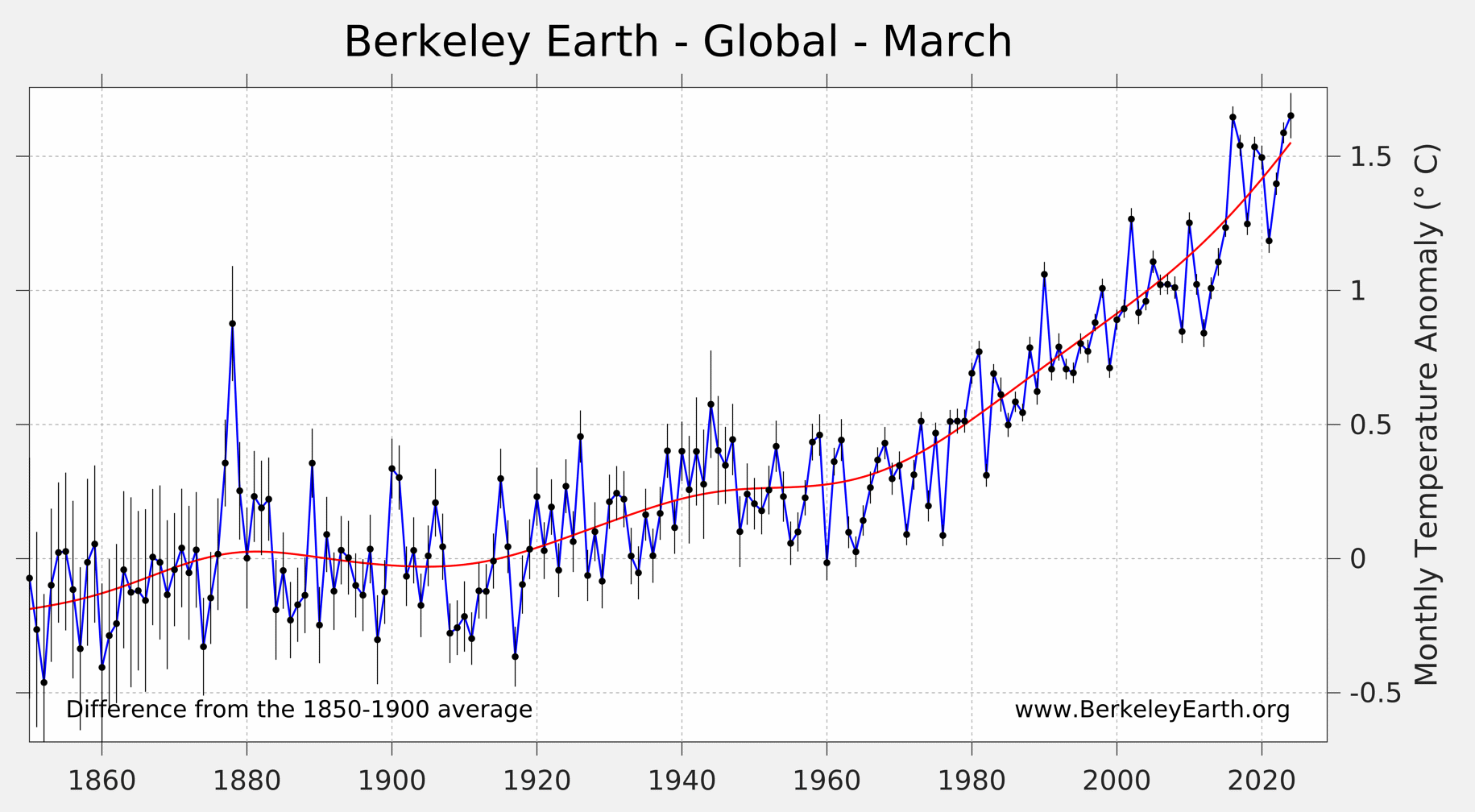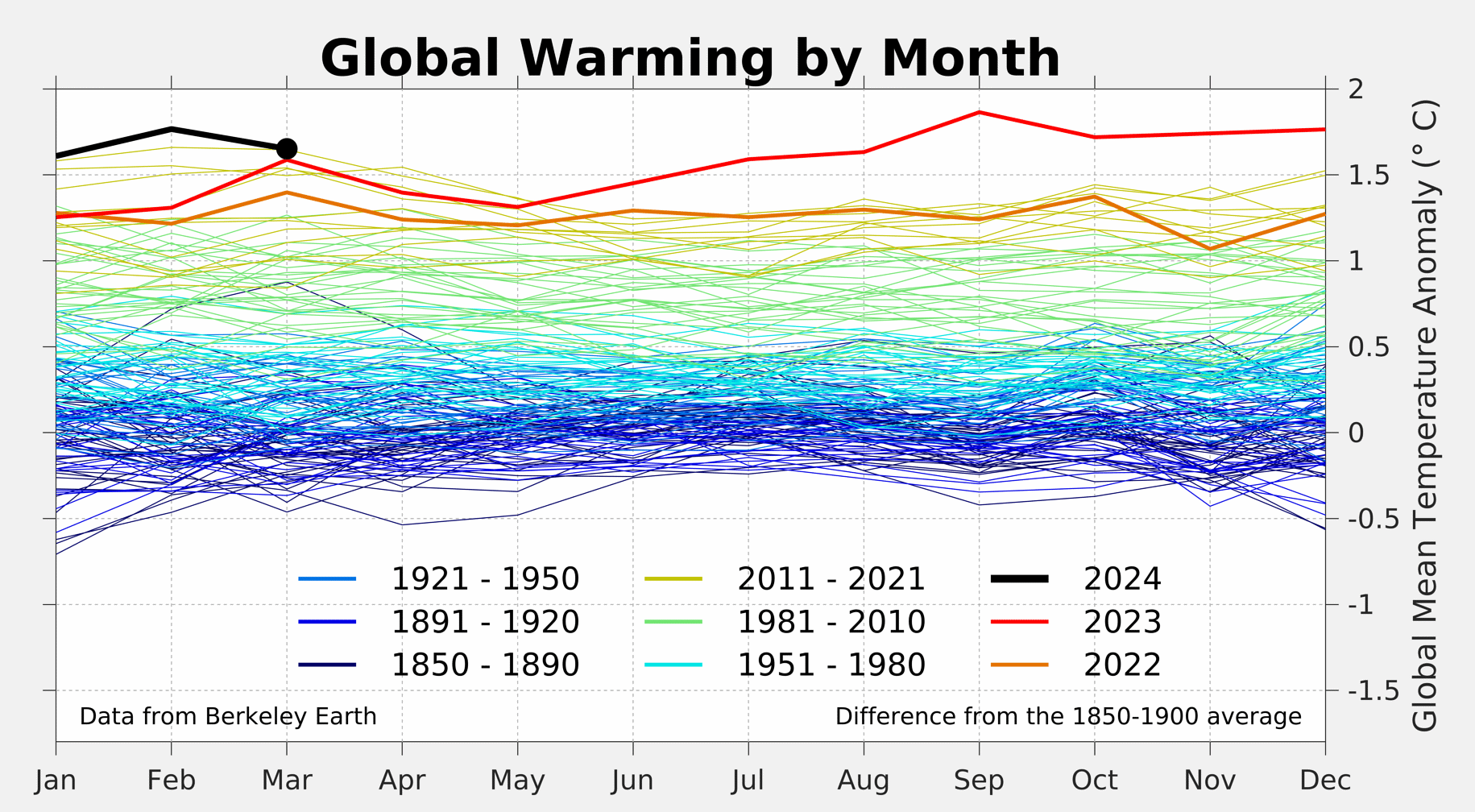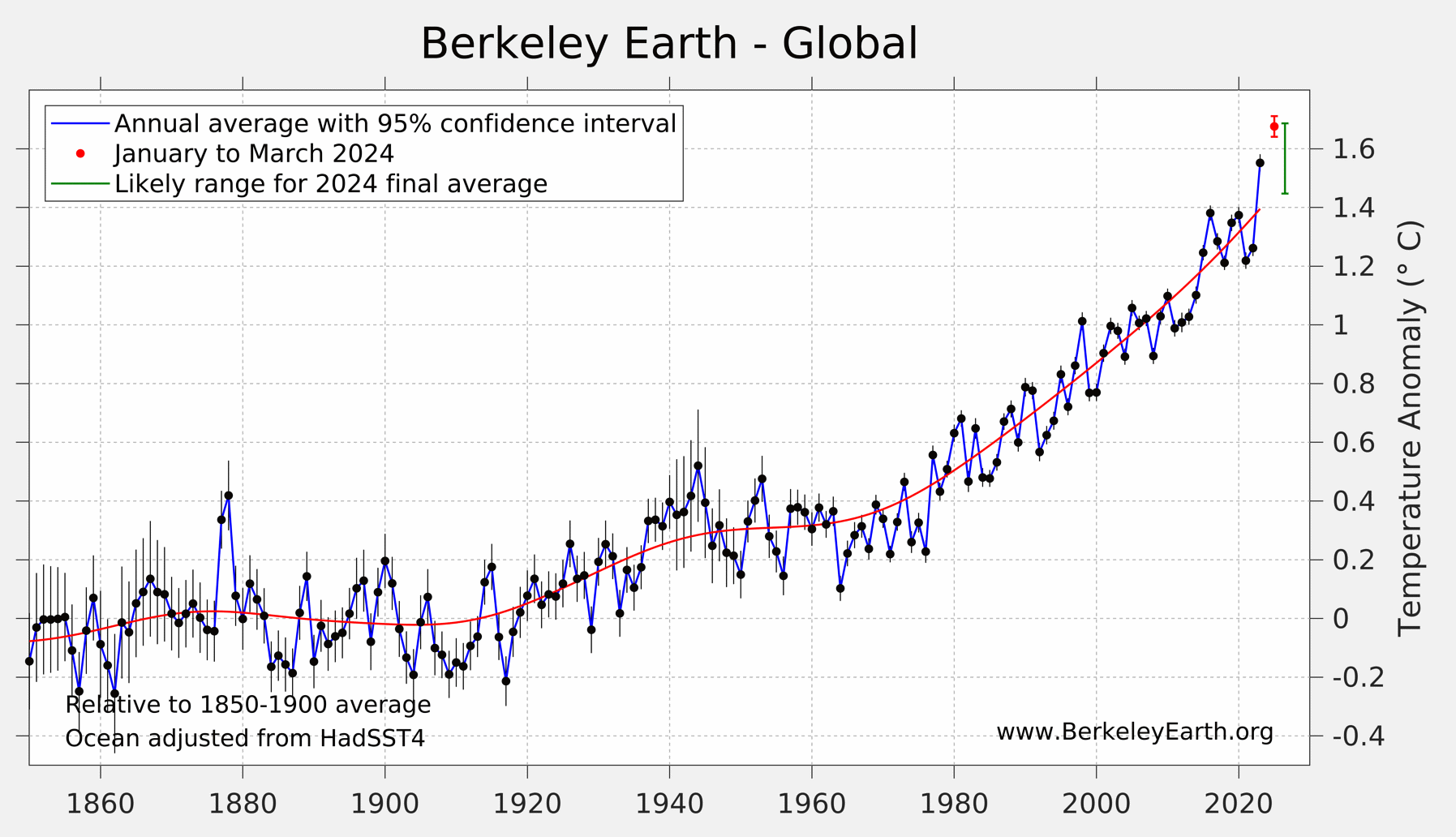The most powerful thing any individual can do.
I vote
Results 6,801 to 6,810 of 6810
Thread: Any doubts about Climate Change?
-
30-04-2024, 02:38 PM #6801
-
01-05-2024, 04:31 AM #6802
Over 100 confirmed tornados in the Midwest of the USA in 72 hours make for a new all-time record. Add heat, energy, entropy into the system and this is what you get.
-
01-05-2024, 09:37 AM #6803
-
01-05-2024, 09:53 AM #6804
Err...that would be the heat.
-
06-05-2024, 05:17 PM #6805
Copernicus – March 2024 was the warmest March recorded

This is the tenth month in a row that is the warmest on record for the respective month of the year. The month was 1.68°C warmer than an estimate of the March average for 1850-1900, the designated pre-industrial reference period. The global-average temperature for the past twelve months (April 2023 – March 2024) is the highest on record, at 0.70°C above the 1991-2020 average and 1.58°C above the 1850-1900 pre-industrial average.
__________
March 2024 Temperature Update - Berkeley Earth
Berkely Earth – March 2024 was the warmest March recorded

March 2024 continues the run started in July 2023 of each individual month being at least 1.5 °C warmer than the 1850 to 1900 average.
The last ten months have been extraordinary in terms of global average temperatures, with new monthly records being set every month and often by large margins. However, March adds to that run only by the slimmest of margins.

Rest of 2024
2024 will very likely be one of the two warmest years since instrumental measurements began. Whether it is the warmest year on record will depend on whether it can maintain its current warmth long enough to exceed the record annual average set in 2023. It is typically true that the second year after an El Niño emerges is warmer than the first, though that is not guaranteed.
Estimated Probability of 2024 Annual Average final rankings:
- 1st – 59%
- 2nd – 41%
- 3rd or lower – <1%
 Keep your friends close and your enemies closer.
Keep your friends close and your enemies closer.
-
07-05-2024, 09:21 PM #6806
-
12-05-2024, 03:14 PM #6807
- Copernicus – April 2024 was the warmest April recorded

Globally, April 2024 was:
- 0.67°C warmer than the 1991-2020 average for April
- the warmest April on record, 0.14°C warmer than April 2016, the previous warmest April
- 1.58°C warmer than an estimate of the pre-industrial average for 1850-1900
- the eleventh consecutive month (since June 2023) for which the monthly temperature has been the warmest on record for the respective month of the year. While unusual, a similar streak of monthly global temperature records previously occurred in 2015/2016, lasting up to 15 months.
____________
Fuelled by climate change, the world's oceans have broken temperature records every single day over the past year, a BBC analysis finds.
Nearly 50 days have smashed existing highs for the time of year by the largest margin in the satellite era.
Planet-warming gases are mostly to blame, but the natural weather event El Niño has also helped warm the seas.
The super-heated oceans have hit marine life hard and driven a new wave of coral bleaching.
The analysis is based on data from the EU's Copernicus Climate Service.
Copernicus also confirmed that last month was the warmest April on record in terms of global air temperatures, extending that sequence of month-specific records to 11 in a row.
For many decades, the world's oceans have been the Earth's 'get-out-of-jail card' when it comes to climate change.
Not only do they absorb around a quarter of the carbon dioxide that humans produce, they also soak up around 90% of the excess heat.
But over the past year, the oceans have displayed the most concerning evidence yet that they are struggling to cope, with the sea surface particularly feeling the heat.
From March 2023, the average surface temperature of the global oceans started to shoot further and further above the long-term norm, hitting a new record high in August.
Recent months have brought no respite, with the sea surface reaching a new global average daily high of 21.09C in February and March this year, according to Copernicus data.
As the graph below shows, not only has every single day since 4 May 2023 broken the daily record for the time of year, but on some days the margin has been huge.

-
19-05-2024, 11:25 AM #6808
NOAA – April 2024 was the warmest April on record

2024 Year-to-date (January – April). Warmest January – April recorded

NOAA
____________
Climate change made the deadly heatwaves that hit millions of highly vulnerable people across Asia more frequent and extreme
Throughout April and continuing into May 2024, extreme record-breaking heat led to severe impacts across the Asian continent.
From Israel, Palestine, Lebanon and Syria, in the West, to Myanmar, Thailand, Vietnam and the Philippines in the East, large regions of Asia experienced temperatures well above 40°C for many days. The heat was particularly difficult for people living in refugee camps and informal housing, as well as for outdoor workers.
Heatwaves are arguably the deadliest type of extreme weather event and while the death toll is often underreported, hundreds of deaths have been reported already in most of the affected countries, including Palestine, Bangladesh, India, Thailand, Myanmar, Cambodia and the Philippines. The heat also had a large impact on agriculture, causing crop damage and reduced yields, as well as on education, with holidays having to be extended and schools closed in several countries, affecting millions of students.
Extreme heat in South Asia during the pre-monsoon season is becoming more frequent. Two previous World Weather Attribution studies focused on extreme heat events in the region: the 2022 India and Pakistan heatwave and the 2023 humid heatwave that hit India, Bangladesh, Lao PDR and Thailand. Despite differences in the nature and impact of the events (drier heat in 2022 leading to widespread loss of harvest, and humid heat in 2023 with greater impacts on people), both studies found that human-induced climate change influenced the events, making them around 30 times more likely and much hotter.
Scientists from Lebanon, Sweden, Malaysia, the Netherlands, the United States and the United Kingdom collaborated to assess to what extent human-induced climate change altered the likelihood and intensity of the extreme heat in three Asian regions: 1) West Asia, including Syria, Lebanon, Israel, Palestine and Jordan; 2) the Philippines in East Asia; and 3) South and Southeast Asia, including India, Bangladesh, Myanmar, Lao PDR, Vietnam, Thailand and Cambodia.
https://www.worldweatherattribution....t-and-extreme/
____________
Extra
-
26-05-2024, 01:07 PM #6809
NASA – April 2024 was the warmest April recorded

NASA
____________
Looking ahead. Where 2024 will rank

-
Yesterday, 12:23 PM #6810
JMA – April 2024 was the warmest April recorded

Five Warmest Years (Anomalies)
1st. 2024 (+0.67°C), 2nd. 2016 (+0.46°C), 3rd. 2020 (+0.36°C), 4th. 2019( +0.34°C), 5th. 2023 (+0.30°C)
JMA
__________
Corporations invested in carbon offsets that were ‘likely junk’, analysis says
Some of the world’s most profitable – and most polluting corporations – have invested in carbon offset projects that have fundamental failings and are “probably junk”, suggesting industry claims about greenhouse gas reductions were likely overblown, according to new analysis.
Delta, Gucci, Volkswagen, ExxonMobil, Disney, easyJet and Nestlé are among the major corporations to have purchased millions of carbon credits from climate friendly projects that are “likely junk” or worthless when it comes to offsetting their greenhouse gas emissions, according to a classification system developed by Corporate Accountability, a non-profit, transnational corporate watchdog.
Some of these companies no longer use CO2 offsets amid mounting evidence that carbon trading do not lead to the claimed emissions cuts – and in some cases may even cause environmental and social harms.
However, the multibillion-dollar voluntary carbon trading industry is still championed by many corporations including oil and gas majors, airlines, automakers, tourism, fast-food and beverage brands, fashion houses, banks and tech firms as the bedrock of climate action – a way of claiming to reduce their greenhouse gas footprint while continuing to rely on fossil fuels and unsustainable supply chains.
Yet, for 33 of the top 50 corporate buyers, more than a third of their entire offsets portfolio is “likely junk” – suggesting at least some claims about carbon neutrality and emission reductions have been exaggerated according to the analysis. The fundamental failings leading to a “likely junk” ranking include whether emissions cuts would have happened anyway, as is often the case with large hydroelectric dams, or if the emissions were just shifted elsewhere, a common issue in forestry offset projects.
“These findings add to the mounting evidence that peels back the greenwashed facade of the voluntary carbon market and lays bare the ways it dangerously distracts from the real, lasting action the world’s largest corporations and polluters need to be taking,” said Rachel Rose Jackson, Corporate Accountability’s director of research.
The fossil fuel industry is by far the largest investor in the world’s most popular 50 CO2 offsetting schemes. At least 43% of the 81m CO2 credits purchased by the oil and gas majors are for projects that have at least one fundamental flaw and are “probably junk”, according to the analysis.
The transport industry, which accounts for about a fifth of all global planet-warming emissions, has also relied heavily on carbon offsetting projects to meet climate goals. Just over 42% of the total credits (55m) purchased by airlines and 38% purchased by automakers (21m) for the top 50 projects are likely worthless at reducing emissions, the analysis found.
The new analysis, shared with the Guardian, builds on a joint investigation last year into the top 50 CO2 offset projects – those that have sold the most carbon credits in the global market. The vast majority of the most popular 50 offset projects were classified as likely or potentially junk due to one or more fundamental failing that undermines its promised emission cut, according to the criteria and classification system applied to the analyses.
__________
extra
Climate deniers like DeSantis hurt most vulnerable communities, scientists say
Misinformation spread by climate deniers such as Florida’s extremist Republican governor, Ron DeSantis, increases the “vulnerability” of communities in the path of severe weather events, scientists are warning.
The message comes on Saturday, the first day of what experts fear could be one of the most intense and dangerous Atlantic hurricane seasons on record, threatening a summer of natural disasters across the US.
Earlier this month, DeSantis signed a law erasing the words “climate change” from Florida statutes and in effect pledging the state’s future to burning fossil fuels, a significant contributory factor in global warming and an unprecedented “supersizing” of hurricanes’ destructive power.
“I can say I don’t believe in gravity, but if I step off a cliff I’m still going down,” Katharine Hayhoe, chief scientist of the Nature Conservancy, said during a webinar hosted by the group to discuss expectations for the six-month-long hurricane season.
“When we decide not to react to the information that science provides us, it’s a choice to increase our vulnerability rather than decrease it.”
Hayhoe also noted that “hurricanes are getting stronger and more dangerous, heavy rainfall is getting more frequent, home insurance is going up”, saying she’s “worried about what this means for my city”.
“We can say all of those things without mentioning the words ‘climate change’,” she continued.
“There are conversations that can still happen, and must still happen. It illustrates the importance of cities, community organizations, researchers, businesses, homeowners’ associations and insurance companies carrying that conversation and making the direct connection between what’s happening and why it matters to our homes, the places we live, our families and the people, places and things that matter most.”
Hayhoe said water in the Atlantic and Caribbean was already as hot as temperatures usually recorded at the peak of hurricane season in August and September. That does not bode well for a summer in which the National Oceanic and Atmospheric Administration (Noaa) expects up to 25 named tropical storms, including four to seven major hurricanes with winds at 111mph (179km/h) or higher.
“Heat-trapping gasses are building up in the atmosphere and wrapping an extra blanket around the planet, and nearly 90% of this extra heat is going to the ocean,” she said.
“We’ve been looking at record warm ocean temperatures for over a year now and they are what fuel these storms. When you think about that massive amount of heat and tropical storms plugged into the ocean as their power source, you can understand how we are really supercharging these events.”
The destructive power of storms has intensified so much in recent years that in February, a scientific study recommended adding a category 6 to the existing five-stage Saffir-Simpson scale to account for mega-hurricanes with sustained winds above 192mph. During the past decade, five storms would have met that criterion, the researchers said.
Hayhoe said other factors, including the amount of inland rainfall a storm might bring, also needed to be considered.
“There are indications that the storms are moving more slowly, which contributes to more rain because they’re sitting over you for longer,” she said. “And once they move over land, we are seeing that they’re lasting longer and weakening more slowly, so they’re reaching farther inland with greater impacts.”
_________
A reminder. It’s not the sun

Thread Information
Users Browsing this Thread
There are currently 6 users browsing this thread. (0 members and 6 guests)






 Reply With Quote
Reply With Quote






